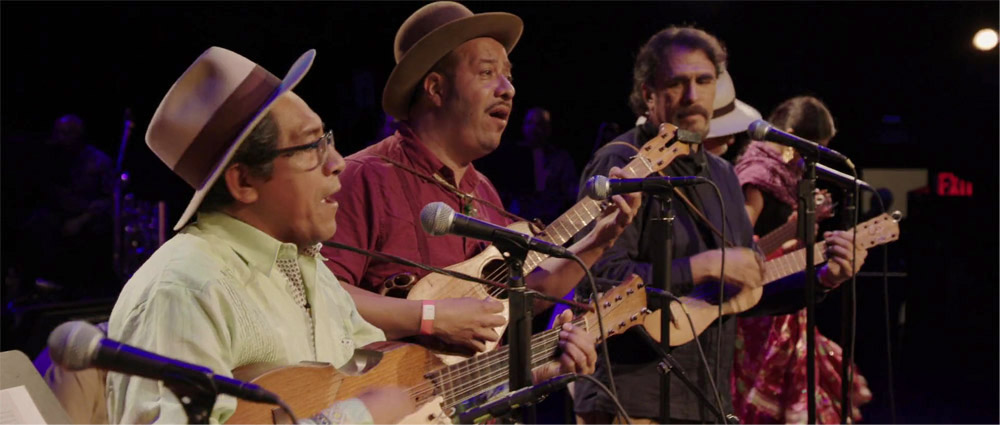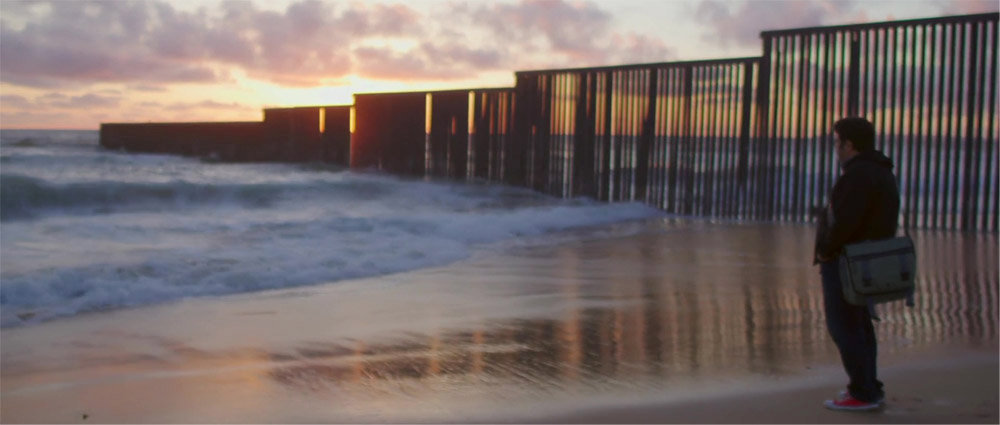| |
“I’m just grateful that the themes of the film are being communicated but we’re also spreading the love and joy. We’re giving people a cultural adventure to be able to experience during this time of lock down.” |
| |
Director Varda Bar-Kar, CNN Interview December 2020** |
| |
“Music is what tells us that the human race is greater than we realise.” |
| |
(Of all people…) Napoleon Bonaparte |
After four years of Trump, Fandango at the Wall is like a profound exhalation of sheer relief. It is a celebration of music, a joyous carnival of culture and more than anything else, a reaffirmation of genuine humanity and what unites us and of what we are essentially capable regardless of the divisive aspects of race, skin colour and patriotism. Mexico itself suffered in particular from the ignorance and malice that constituted Trump’s unspeakably offensive rhetoric; that and his idea of ‘building the wall’. America’s inexplicable descent into the quagmire of far right conspiracies and the exultation of ignorance punched the world hard in the gut. Fandango is the friend that offers a hand to help it back to its feet. Music has a singular power to dodge and pierce our social defences set up to keep us protected from the sharper edges of an indifferent world. But true love requires those defences lowered. At our most vulnerable is when we find those reservoirs of true, primal emotion. It’s why love hurts - as well as inspires - as diamond hard as it does. But whether you are a fan of son jarocho or not (a 300 year old musical tradition from Veracruz which absorbs and reinterprets indigenous Spanish and African traditions) is utterly irrelevant. The music, with some of the most surreal lyrics, is the delivery system. What it delivers has very real, moving and passionate power.
The annual Fandango Fronterizo Festival is organised by a retired librarian Jorge Francisco Castillo. Son jarocho musicians gather on both sides of the border wall in Tijuana and San Diego to perform for anyone who’d like to come along. New York based Arturo O’Farrill, a famous jazz musician in his own right, is also the director of the Afro Latin Jazz Orchestra. The idea of the fandango intrigued him so he set off to Mexico – incidentally where he was born – together with fellow musician and polymath Kabir Sehgal to see if he and his musical friends could become involved and give the event a little push and more exposure by his and his orchestra’s participation. I think they can tick that box. That the film’s credited executive producers are two giants in the music business and one hugely respected politician – Quincy Jones, Carlos Santana and Andrew Young respectively - should give you a clue as to how important this event was regarded by the respected music monarchs of our age. It hasn’t the scale of Live Aid or the commerciality of concert events. But it does have great warmth, love and musical virtuosity - and filmmaking talent - by the bucket load. And it speaks intensely of the course correction we must make by sharing what we do have in common and not inflaming what sets us apart. Fandango should be the world’s first lesson in ‘Civility 101’. No words. Just music.

Mexico has had a bad rap whichever way you slice the media pie. Ravaging banditos who don’t need “no stinking badges,” the US’s indentured lower classes, and the drug cartels with giant underworld figures living large. Yes, ponchos and sombreros are in there too but if you have not been to a country, almost everything you think you know about it is almost certainly bullshit. As Kabir says in the film, “the sooner you encounter people who are different than you, prepares you for the world.” Fandango introduces us to a people who have been so unfairly misrepresented over decades, it comes as something of a shock to see… normality. It’s so refreshing to see ordinary (and extraordinary) people who have all the same concerns as most of us, people who are visibly upset by the way the country has changed. The growth of violence in their societies means that their own children cannot play as freely as they were once able. But gestures of support to those travelling on ‘the Beast’ (the train that takes hopefuls north) gladden the heart. Women prepare food bundles and throw them to the hungry on the roofs of these great thundering machines. What compels them to do this, to extend help to those they’ve never met and will never meet makes me feel humble. This selfless act really touched me as did most of the simple delights of human interactivity underlined by the unfettered pleasure and joy coming off Arturo like sunbeams.
Musical ability somehow confers the stars of the show with an all access pass to what seems to really matter, the ineffable bonds that we all share across all divides. The oft-repeated maxim of “This wall is not dividing us. It’s uniting us,” is no less powerful for its simplicity. Without the wall, there would not be this outpouring of support and expression of benign intent. That’s not to say the symbol of national fear should not be politically neutralised. Both Trump and Brexit happened largely because of immigration fears stoked alarmingly by social media. Fandango goes some way to allay the fear of ‘the other’. ‘The other’ is just us in different clothes, with access to different opportunities, wildly varying fortunes and speaking a different language. The language we all speak, of course, is that of music and to paraphrase a superb catchphrase from an old beer ad, it reaches the parts that other communications cannot reach.
Fandango is also beautifully made. You are never aware – aside from the odd reflection – that Fandango is being shot. You simply accept the characterisation of the participants from the artfully chosen camera angles and sensitivity of the editing. It is invisible technique, something editors generally strive for. You know there’s a cameraperson in the car but you never think about it, not once. I suspect a significant talent of the director, Varda Bar-Kar, making such a film is largely corralling what must have been hundreds of hours of rushes and fashioning an emotive tale with the help of fellow storyteller and film editor Luisa María Martínez Arcaraz. Of course you can plan, prepare and suggest bespoke shots but you must have absolute faith in your camera people. In situations like this, they become your co-directors of a kind shooting the actuality. And there is a great skill in interview technique that allows the interviewed total freedom and ease to express themselves. Director Bar Kar has this skill. All those interviewed come across as thrilled to impart their experiences. Directors of these kinds of documentaries have to be excellent listeners. This is also a film in which the selected drone shots are absolutely germane to understanding what a ridiculous construct the wall actually is. As writer Caitlin Flanagan once remarked, it’s not like we’ve not invented ladders. These days, drone shots are so ubiquitous as to be dull beyond measure but the few in Fandango say what needs to be said and say it well.

Editing a live music performance is, to say the least, daunting. Depending on the number of cameras you have recording the event, your choices of different combinations of shots edges into the exponential mathematics of billions. The two main musical concerts, one at the wall, the other at a theatre in New York, are different in style only necessitated by the physical limitations of each space. Then you have the risk of justifiable criticism if cutting in a shot where the musician on screen is not playing the music heard (a nightmare, that one – which is why shots of audience members are so important!) The fact that I saw so few ‘audience’ cutaway shots tells me one thing for sure. The editing of these concerts probably took weeks! Both are beautifully constructed (with my own taste just preferring the actual wall concert for its spontaneity and sheer joy) and again, there’s never a sense that you are watching a film, so unnoticeable is the craft.
I know it’s somewhat unfair of me to review a film so favourably, knowing that it’s simply not available to stream in this country yet. It’s cinematic teasing but it will get here. When it does, you should check it out if, for nothing else, the stereotypes it dismantles and the sense of hope it imparts. God knows, we could use that these days. Bravo, everyone involved.
|